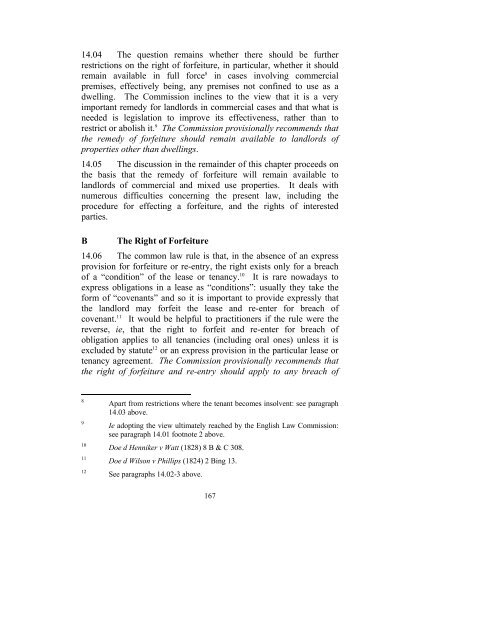Consultation Paper on the General Law of the Landlord and Tenant
Consultation Paper on the General Law of the Landlord and Tenant
Consultation Paper on the General Law of the Landlord and Tenant
Create successful ePaper yourself
Turn your PDF publications into a flip-book with our unique Google optimized e-Paper software.
14.04 The questi<strong>on</strong> remains whe<strong>the</strong>r <strong>the</strong>re should be fur<strong>the</strong>rrestricti<strong>on</strong>s <strong>on</strong> <strong>the</strong> right <strong>of</strong> forfeiture, in particular, whe<strong>the</strong>r it shouldremain available in full force 8 in cases involving commercialpremises, effectively being, any premises not c<strong>on</strong>fined to use as adwelling. The Commissi<strong>on</strong> inclines to <strong>the</strong> view that it is a veryimportant remedy for l<strong>and</strong>lords in commercial cases <strong>and</strong> that what isneeded is legislati<strong>on</strong> to improve its effectiveness, ra<strong>the</strong>r than torestrict or abolish it. 9 The Commissi<strong>on</strong> provisi<strong>on</strong>ally recommends that<strong>the</strong> remedy <strong>of</strong> forfeiture should remain available to l<strong>and</strong>lords <strong>of</strong>properties o<strong>the</strong>r than dwellings.14.05 The discussi<strong>on</strong> in <strong>the</strong> remainder <strong>of</strong> this chapter proceeds <strong>on</strong><strong>the</strong> basis that <strong>the</strong> remedy <strong>of</strong> forfeiture will remain available tol<strong>and</strong>lords <strong>of</strong> commercial <strong>and</strong> mixed use properties. It deals withnumerous difficulties c<strong>on</strong>cerning <strong>the</strong> present law, including <strong>the</strong>procedure for effecting a forfeiture, <strong>and</strong> <strong>the</strong> rights <strong>of</strong> interestedparties.B The Right <strong>of</strong> Forfeiture14.06 The comm<strong>on</strong> law rule is that, in <strong>the</strong> absence <strong>of</strong> an expressprovisi<strong>on</strong> for forfeiture or re-entry, <strong>the</strong> right exists <strong>on</strong>ly for a breach<strong>of</strong> a “c<strong>on</strong>diti<strong>on</strong>” <strong>of</strong> <strong>the</strong> lease or tenancy. 10 It is rare nowadays toexpress obligati<strong>on</strong>s in a lease as “c<strong>on</strong>diti<strong>on</strong>s”: usually <strong>the</strong>y take <strong>the</strong>form <strong>of</strong> “covenants” <strong>and</strong> so it is important to provide expressly that<strong>the</strong> l<strong>and</strong>lord may forfeit <strong>the</strong> lease <strong>and</strong> re-enter for breach <strong>of</strong>covenant. 11 It would be helpful to practiti<strong>on</strong>ers if <strong>the</strong> rule were <strong>the</strong>reverse, ie, that <strong>the</strong> right to forfeit <strong>and</strong> re-enter for breach <strong>of</strong>obligati<strong>on</strong> applies to all tenancies (including oral <strong>on</strong>es) unless it isexcluded by statute 12 or an express provisi<strong>on</strong> in <strong>the</strong> particular lease ortenancy agreement. The Commissi<strong>on</strong> provisi<strong>on</strong>ally recommends that<strong>the</strong> right <strong>of</strong> forfeiture <strong>and</strong> re-entry should apply to any breach <strong>of</strong>89101112Apart from restricti<strong>on</strong>s where <strong>the</strong> tenant becomes insolvent: see paragraph14.03 above.Ie adopting <strong>the</strong> view ultimately reached by <strong>the</strong> English <strong>Law</strong> Commissi<strong>on</strong>:see paragraph 14.01 footnote 2 above.Doe d Henniker v Watt (1828) 8 B & C 308.Doe d Wils<strong>on</strong> v Phillips (1824) 2 Bing 13.See paragraphs 14.02-3 above.167
















